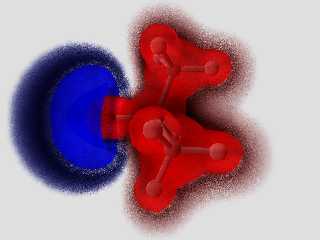 |
 |
|
 |
|
 |
|  |
|  |
|
 |
From: Jim Kress
Subject: electrostatic potential molecular media and isosurface
Date: 14 Mar 1999 23:59:55
Message: <36ec93cb.0@news.povray.org>
|
|
 |
|  |
|  |
|
 |
As I promised, here is a color representation of a molecular electrostatic
potential using a mixture of isosurfaces and media. The blue is negatively
charged, the red is positive.
Comments and suggestions are always appreciated (and usually implemented).
Enjoy!
Jim
Also, per Johannes' suggestion, I did a quick animation of this spinning
around the y-axis. It will be posted in the binaries.animation section
right after this one is posted in the binaries.images.
Post a reply to this message
Attachments:
Download 'electrostatic potential molecular media and isosurface.jpg' (45 KB)
Preview of image 'electrostatic potential molecular media and isosurface.jpg'

|
 |
|  |
|  |
|
 |
|
 |
|  |
|  |
|
 |
Jim Kress wrote:
>
> As I promised, here is a color representation of a molecular electrostatic
> potential using a mixture of isosurfaces and media. The blue is negatively
> charged, the red is positive.
>
> Comments and suggestions are always appreciated (and usually implemented).
>
> Enjoy!
>
> Jim
>
> Also, per Johannes' suggestion, I did a quick animation of this spinning
> around the y-axis. It will be posted in the binaries.animation section
> right after this one is posted in the binaries.images.
>
> [Image]
Aside from the neat effect you have going with media there that's
some of the clearest electron microscopy I have ever seen. We use
to send a lot of materials out for SEM (scanning electron microscope)
evaluation and seldom did we get this type of clarity in the imagery
returned. Often times the material properties were such the the depth
of imagable area dropped so rapidly that only spot or two would appear
in the image and the rest was out of focus or completely dark.
Have you found it difficult to get the media to respond to your will
or has it gotten to the point where you are starting to have the control
you need to do as you wish. ? Any pointers or insider tips you would like
to share with your readers on the subject ?
--
Ken Tyler
mailto://tylereng@pacbell.net
Post a reply to this message
|
 |
|  |
|  |
|
 |
From: Jim Kress
Subject: Re: electrostatic potential molecular media and isosurface
Date: 15 Mar 1999 18:50:50
Message: <36ed9cda.0@news.povray.org>
|
|
 |
|  |
|  |
|
 |
Thanks for the kind words.
No tips or tricks from me yet. I've managed to get it to do what I wanted
through a lot of experimentation. I think it will take some time with
people using media to really map out how all the parameters can be specified
to achieve varying effects.
Also, the results I'm posting are not from experiment but from detailed,
high order molecular quantum mechanics calculations so they probably are a
bit better defined than the SEM work to which you referred.
--
Jim
Check out my web site http://www.kressworks.com/
It'll blow your mind (politically), stimulate your senses (artistically)
and provide scientific insights beyond compare!
Be sure to read the Warp maintained POV VFAQ:
http://iki.fi/warp/povVFAQ.html
Ken wrote in message <36EC9E38.1892A176@pacbell.net>...
>Jim Kress wrote:
>>
>> As I promised, here is a color representation of a molecular
electrostatic
>> potential using a mixture of isosurfaces and media. The blue is
negatively
>> charged, the red is positive.
>>
>> Comments and suggestions are always appreciated (and usually
implemented).
>>
>> Enjoy!
>>
>> Jim
>>
>> Also, per Johannes' suggestion, I did a quick animation of this spinning
>> around the y-axis. It will be posted in the binaries.animation section
>> right after this one is posted in the binaries.images.
>>
>> [Image]
>
> Aside from the neat effect you have going with media there that's
>some of the clearest electron microscopy I have ever seen. We use
>to send a lot of materials out for SEM (scanning electron microscope)
>evaluation and seldom did we get this type of clarity in the imagery
>returned. Often times the material properties were such the the depth
>of imagable area dropped so rapidly that only spot or two would appear
>in the image and the rest was out of focus or completely dark.
>
> Have you found it difficult to get the media to respond to your will
>or has it gotten to the point where you are starting to have the control
>you need to do as you wish. ? Any pointers or insider tips you would like
>to share with your readers on the subject ?
>
>--
>Ken Tyler
>
>mailto://tylereng@pacbell.net
Post a reply to this message
|
 |
|  |
|  |
|
 |
|
 |
|  |




![]()